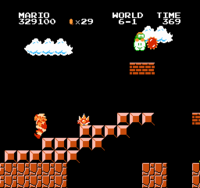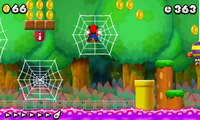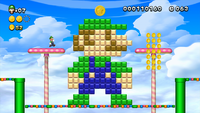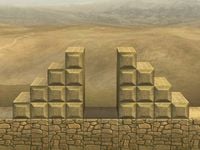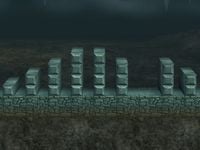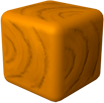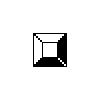Hard Block
- Not to be confused with Stone Block.
Template:Item-infoboxTemplate:Quote2
A Hard Block is one of the many blocks in the Mario universe. They are commonly used to make stair-like structures. Unlike ? Blocks and Brick Blocks, Hard Blocks cannot contain items or Coins. Mario and Luigi are not normally able to destroy Hard Blocks, but certain methods, such as entering a Mega state or using a Big Thwomp, can be used to destroy them.
History
Super Mario series
Super Mario Bros. / Super Mario Bros.: The Lost Levels
Hard Blocks make their debut in Super Mario Bros., and reappear in Super Mario Bros.: The Lost Levels with an identical appearance and purpose. Their most notable use is to create stairs at the end of many levels leading to the top of the flagpole, which itself has a Hard Block as its base. In some levels, they are used to create much more gently-sloped stairs as a minor obstacle.
Super Mario Bros. 3
Hard Blocks also appear in Super Mario Bros. 3, where they are known as Wood Blocks.[1] Some Wood Blocks are bouncy; these blocks bounce Mario or Luigi away if they run against their sides, and are sometimes found near pits as an obstacle. Some of these blocks also hold items, only releasing them if they are bumped into or hit with a shell or tail whip.
Chain Chomps are usually found attached to Wood Blocks. Larger inert Wood Blocks appear in the fourth world, Giant Land.
In the GBA version, the Hard Blocks' design from the Super Mario All-Stars version of Super Mario Bros. returns in Classic World 1-1, Classic World 1-2, and Classic World 2-2.
Super Mario World
Hard Blocks, now called Gray Blocks[2] (alternatively gray Block[3] or Grey Block[4]), appear once again in Super Mario World with a different redesign, this time resembling blocks of stone. They reprise their purpose from previous games.
New Super Mario Bros.
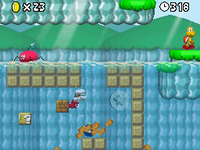
Hard Blocks reappear in New Super Mario Bros. at the end of most levels like in Super Mario Bros., used as a staircase to reach the flagpole. The flagpole itself has a new fortress-styled base instead of a Hard Block. If Mario gains a Mega Mushroom and turns into Mega Mario, he can destroy Hard Blocks simply by running into them. Volcanic debris can also destroy Hard Blocks.
New Super Mario Bros. Wii
Hard Blocks reappear in New Super Mario Bros. Wii, but only in World ![]() Coin-2.
Coin-2.
Super Mario 3D Land
Wood Blocks from Super Mario Bros. 3 return in Super Mario 3D Land, where they are usually twice as large (like those in Giant Land) and have a more yellow color. Hard Blocks with the design from Super Mario Bros. return at the end of World 2-3 and Special 1-3.
New Super Mario Bros. 2
While wooden and stone Hard Blocks return, golden and colored Hard Blocks make their debut in New Super Mario Bros. 2. Pink, green, blue, orange, beige, brown, gold, black, light blue, red and yellow are the only known colors.
New Super Mario Bros. U / New Super Luigi U
Hard Blocks return in New Super Mario Bros. U, referred to as stone blocks[citation needed]. Colored stone blocks also appear in New Super Luigi U, used mostly for decoration, or to make pixel art such as 8-bit Luigis, a common Easter egg in the game.
Super Mario Maker / Super Mario Maker for Nintendo 3DS
In Super Mario Maker and its 3DS version, all four designs of the Hard Blocks based on the four level styles appear. They can be destroyed by strong enemies, including Big Koopa Troopa shells, Big Thwomps, Bob-ombs, Magikoopas' magic attacks, Skewers, and Bowser. A new method of breaking Hard Blocks is firing a fully charged shot from a Fire Koopa Clown Car. They can also be destroyed by Big Mario.
Super Mario Maker 2
Hard Blocks also appear in Super Mario Maker 2. They have the same functionality as they did in Super Mario Maker, except that they cannot be broken by Big Mario from the side, though they can still be broken when hit by Big Mario from above or under. Link's bombs can now also destroy Hard Blocks. Giant Spiked Balls, a big Blasta Mechakoopa's missile explosion, a big Zappa Mechakoopa's laser beam, and Ground Pounds from some Koopalings can destroy Hard Blocks. They can also be given wings, and when playing a course, they will fly a few blocks left, then fly twice as many blocks right, then fly that many blocks left, and repeat the last two actions. Hard Blocks can also stop the screen from scrolling, so it is possible to make a course that requires breaking Hard Blocks stopping the screen from scrolling to advance.
In the Super Mario 3D World style, they take the form of Rock Blocks. If the player uses the Super Hammer, they can break these blocks with a hammer swing. They can also be broken by Banzai Bills, a Porcupuffer's explosion from fireballs, and Big Bullies.
 This section is a stub. You can help the Super Mario Wiki by expanding it.
This section is a stub. You can help the Super Mario Wiki by expanding it.
Mario Kart series
Hard Blocks have appeared in the Mario Kart series with either their Super Mario Bros. appearance, or as colored blocks that border Mario Circuit.
Super Smash Bros. series
Super Mario Bros.-styled Hard Blocks appear throughout the Super Smash Bros. series.
The Mushroom Kingdom stage in Super Smash Bros. and the Mushroom Kingdom stage in Super Smash Bros. Melee feature the blocks' classic staircase arrangement in the background. The former also has pass-through platforms made of Hard Blocks (Empty Blocks in Ultimate).
In Super Smash Bros. Brawl, Super Smash Bros. for Nintendo 3DS, and Super Smash Bros. Ultimate, Hard Blocks appear as part of the Mushroomy Kingdom stage. They are arranged just as in World 1-1 (and in Brawl only, World 1-2) of Super Mario Bros. However, they now appear worn, chipped, and cracked, matching the stage's ruined appearance. The block the flagpole stood on in World 1-1 is gone, but only in Brawl and for 3DS; it is in the background in Ultimate. Additionally, Hard Blocks also form the top two layers of the stage's Final Destination form in the 3DS game, and the Battlefield form's platforms in Ultimate.
Mario Clock
In Mario Clock, Hard Blocks appear using their Super Mario Bros. design as the terrain of the bridge stage theme.
Nintendo Badge Arcade
Hard Blocks also appear as badges in Nintendo Badge Arcade. The Super Mario Bros. Hard Blocks appear as part of the Super Mario Bros. set, while Gray Blocks appear as part of the Super Mario Maker set.
Gallery
Super Mario Bros. (underground)
Super Mario All-Stars (Super Mario Bros.)
Super Mario All-Stars (Super Mario Bros. 3)
Super Mario Maker stamp
Names in other languages
| Language | Name | Meaning | Notes |
|---|---|---|---|
| Japanese | 木目ブロック[5] Mokume Burokku 石ブロック[6] Ishi Burokku 硬いブロック Katai Burokku |
Woodgrain Block (Super Mario Bros. 3) Stone Block (New Super Mario Bros. games) Hard Block (Super Mario Maker 2) |
|
| Chinese (simplified) | 坚硬砖块[?] Jiānyìng Zhuānkuài |
Hard block | |
| Chinese (traditional) | 堅硬磚塊[?] Jiānyìng Zhuānkuài |
Hard block | |
| Dutch | Hard blok[?] | Hard Block | |
| Italian | Blocco duro[?] | Hard block | |
| Korean | 딱딱블록[?] Ttakttak Beullok |
Hard Block | |
| Russian | Прочный блок[?] Prochnyy blok |
Solid Block | |
| Spanish (NOA) | Bloque duro[?] | Hard block |
References
- ^ Peterson, Erik. Super Mario Advance 4: Super Mario Bros. 3 Player's Guide. Page 31.
- ^ M. Arakawa. Nintendo Mario Mania Player's Guide. Pages 71, 89, 108, 153.
- ^ M. Arakawa. Nintendo Mario Mania Player's Guide. Page 57.
- ^ M. Arakawa. Nintendo Mario Mania Player's Guide. Page 73.
- ^ Shogakukan. 2015. Super Mario Bros. Hyakka: Nintendo Kōshiki Guidebook, Super Mario Bros. 3 section, page 41.
- ^ Shogakukan. 2015. Super Mario Bros. Hyakka: Nintendo Kōshiki Guidebook, pages 118, 149, 199, 215.
- Blocks
- New Super Mario Bros. objects
- New Super Mario Bros. 2 objects
- New Super Mario Bros. U objects
- Super Mario 3D Land objects
- Super Mario Advance 4: Super Mario Bros. 3 objects
- Super Mario Bros. objects
- Super Mario Bros. 3 objects
- Super Mario Bros.: The Lost Levels objects
- Super Mario Maker objects
- Super Mario Maker 2 objects
- Super Mario World objects
